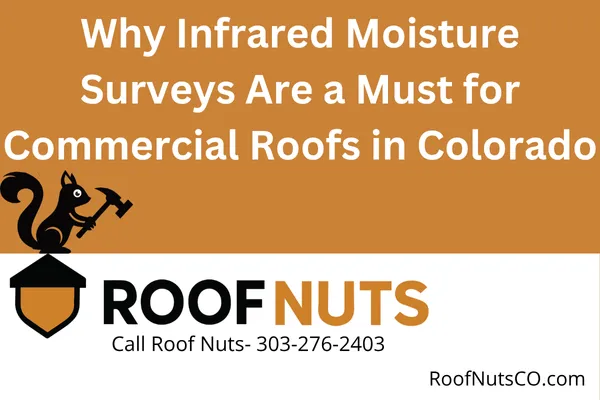
Why Infrared Moisture Surveys Are a Must for Commercial Roofs in Colorado
Infrared Moisture Surveys for Commercial Roofs in Colorado
Infrared moisture surveys are one of the smartest tools for maintaining a commercial flat roof. If you're a property owner or facility manager in Colorado—where hail, snow, and extreme sun can take a toll—this scan can protect your investment before damage becomes visible or expensive.
What Is an Infrared Moisture Survey?
An infrared moisture survey is a non-invasive thermal scan of your commercial roof. Using infrared imaging, a trained technician can identify areas where water has seeped into the roofing system—before it causes visible leaks or structural damage.
How It Works:
Wet insulation retains heat longer than dry areas.
The roof is scanned in the evening, after a warm day.
Problem areas appear as “hot spots” on the thermal image.
These areas are marked for targeted repair or further inspection.
Why Infrared Surveys Matter in Colorado
Colorado’s weather extremes—hail, rapid temperature changes, snowpack, and UV exposure—can accelerate roofing system failure.
Here’s why an infrared scan is a smart move for commercial roofs in Colorado cities like Denver, Colorado Springs, Aurora, and Fort Collins:
Catch leaks before they spread: Moisture trapped in roofing materials can’t always be seen from the surface.
Avoid full tear-offs: Pinpoint repairs based on survey results can save thousands.
Protect insulation and structure: Moisture leads to mold, rot, and reduced thermal efficiency.
Meet insurance and warranty requirements: Many manufacturers and insurers recommend or require regular inspections.
What Types of Roofs Benefit Most?
Infrared moisture surveys are especially effective for:
Low-slope and flat roofs
Built-up roofing (BUR)
Modified bitumen
Single-ply membranes (EPDM, TPO, PVC)
Ideal Times for a Moisture Scan
Timing is everything. Infrared scans work best when the roof has been exposed to sun during the day, and the scan takes place at dusk or just after dark.
In Colorado, the best months are typically:
Spring – after snowmelt, before summer storms
Fall – after hail season, before winter snow
What Happens After a Moisture Survey?
You’ll receive:
A detailed thermal image map of your roof
Marked areas indicating moisture presence
A professional recommendation for targeted repair or roof system evaluation
This information allows you to plan ahead, avoid surprises, and keep your roof warranty intact.
FAQs
How often should I get an infrared moisture survey?
Once every 1–2 years is ideal, especially after hail storms or before a major roofing project.
Is this scan covered by insurance?
While the scan itself usually isn’t, catching and repairing moisture early can help avoid denied claims and costly water damage.
Do I need to shut down operations during the scan?
No. Infrared surveys are non-invasive and performed from the roof’s surface.
Serving All of Colorado
Roof Nuts performs infrared moisture surveys for commercial properties in:
Denver
Colorado Springs
Fort Collins
Aurora
Pueblo
Lakewood
Westminster
Arvada
Greeley
Thornton
We’ll help you find problems before they cost you money.
📞 Call 303-276-2403 or visit RoofNutsCO.com to schedule your scan today.
